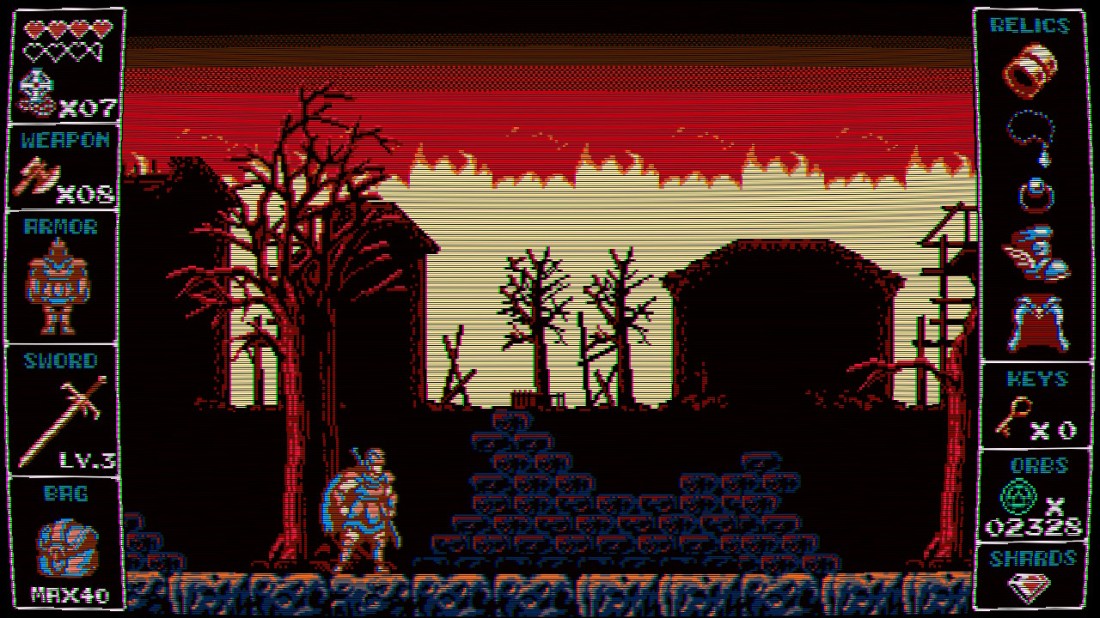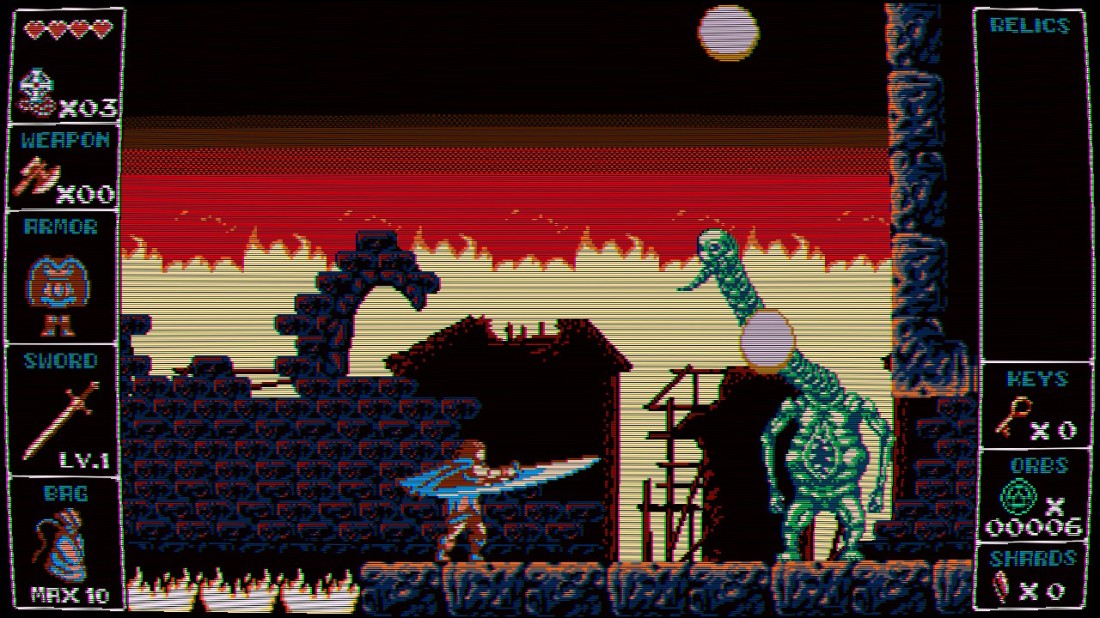A Castlevania Tribute
I’ve been on a Castlevania itch lately. Between trying to main the Belmonts in Super Smash Bros. Ultimate and watching my wife play through Metroidvanias like Symphony of the Night for the first time, I’ve been eager to do some demon slaying. Brazilian indie developer JoyMasher has effectively scratched my itch with Odallus: The Dark Call, a retro platformer inspired by Castlevania III.
Here’s my Video Review for your viewing pleasure!
A brief, pixelated opening cutscene reveals the plight of Haggis, a man who loses his son and discovers his town has been set on fire by monsters. Aside from some dialogue boxes and hidden lore, that’s as much story as the game provides. A simple plot isn’t the only shared aspect between Odallus and old Nintendo games. The rich, detailed 8-bit graphics and gothic rock chiptunes will immediately conjure up nostalgia for anyone who has grown up with the NES. Even the screen replicates tube TV displays; the action takes place on a 4:3 box in the center, and the side menus curve a little, as if you were looking through an old TV screen.

Odallus’s dark, atmospheric stages look like classic Castlevania, but the gameplay isn’t as frustrating as notorious “NES-hard” titles. Like Konami’s 8-bit vampire hunters, Haggis runs, jumps, and brandishes his weapon (a sword instead of a whip), but he moves much swifter and less clunkily. The responsive controls foster smooth gameplay, and the only downside is a lack of customizable button inputs. You jump with the Nintendo Switch’s A button and attack with the Y button, which is awkward to perform due to their placements on the controller. I got used to it eventually, but it’s unlike any other platformers I’ve played. Other than that snag, combat is fast, and a variety of ghoulish enemies and gameplay shifts, such as minecart rides, keep the experience fresh.

There are nine stages, but progression through them isn’t linear. Every area hosts multiple paths that converge and branch out again. Each path has its own challenges, but they all eventually lead to a boss. Slaying the boss opens up the next stage, but as I soon found out, that isn’t enough to beat the game. Almost every level has a devious secret exit, and finding all of them is mandatory to reach the ending. Typically, you need to find a special power-up – such as the ability to move blocks – in a later stage, then return to an earlier area and use it to uncover hidden paths.
There is a fair amount of backtracking, but I embraced it thanks to the level design. Unlike more linear sidescrollers, each stage in Odallus promotes open exploration. I’m free to go anywhere in each 2D area, provided I have the power-ups to reach it. I may find upgrade rewards awaiting me after difficult platforming segments, secret exits from vigilantly scanning the environment, or new subweapons because I solved a puzzle. Speaking of which, the subweapons are similar to Castlevania’s, but you can freely switch between them. I was motivated to go back to a level multiple times, exhaust its rooms, and return whenever I gained a new ability. The game cunningly masks a deep, addictive Metroidvania progression behind its seemingly linear structure.

What I most appreciated was how the developers respected my time. Unlike many old games that restart as soon you reach a game over, Odallus constantly saves your progress. If you lose all your lives or manually leave a stage, you retain all your power-ups and upgrades. This also applies to unlocked doors, solved puzzles, and defeated mini-bosses, which honestly astounded me, as I was expecting to redo entire segments upon death.

Consequently, Odallus is thankfully not frustrating, but it’s also not too long or tough. I spent about eight hours with the game, and that includes revisiting levels and locating all secrets. Luckily the game directly informs you how many secrets are still hidden per stage. It’s a fairly meaty playtime, though I admittedly wanted more. As for the difficulty, the game never feels cheap. There are no annoying instant kills here. My biggest challenges were against the bosses, who exhibited all the properties I seek in end-of-level showdowns. Their death matches all require super precise timing, pattern recognition, and a good eye for weak spots. Besides the final boss, I found the difficulty to be fair. I even felt encouraged to try out the harder Veteran mode, which beyond introducing harder enemies earlier, also switches up item placements and puzzles, significantly altering the game.
Unfortunately, I experienced slowdown and a few glitches, in which I literally fell out of the level and had to restart. It’s a shame that Odallus occasionally suffers from some of these common NES problems, but it didn’t detract too much from my overall enjoyment.

Conclusion
Odallus may look like an NES game, but it plays and handles progression like contemporary titles, respecting the player’s time and offering numerous secrets in an exploration-based 2D world. I went into Odallus: The Dark Call looking for Castlevania and left with an engaging experience that pays tribute to both classic 8-bit titles and modern Metroidvania games.
Score: 8/10
Note: A review copy was used for this article. This review was posted on DarkStation.
Great job on your review! I’ve been loving getting into Metroidvanias too. Starting with Castlevania: Symphony of the Night and then Aria/Dawn of Sorrow (Dawn is my favorite!) and now Portrait of Ruin, I can safely say I’m addicted to the Castlevania series now! I’m also proud of myself for being able to beat them! 😀 I haven’t ventured into the retro NES titles but Odallus appears to be a love letter to the classics. Though it’s level-based, it’s cool that you can freely explore within each area. A retro look with modern mechanics seems to be all the rage these days. Especially Metroidvanias. And I can see why (they’re kinda addictive!).
LikeLiked by 2 people
Thank you so much for your encouragement and support! Yessss, I’m so happy you’re into Castlevania now!! And yes, I’m very proud of you for handling those games with ease. They’re not easy, but you’re getting through them like a pro! I would recommend Odallus: The Dark Call as a game like the classics that’s actually easier than the classics because of the save system and Metroidvania-like upgrades. I would also recommend other similar Metroidvania games like Guacamelee, SteamWorld Dig, and Shantae. And as for classic Castlevania, Rondo of Blood is my favorite of the bunch. Plus, you get to use Richter, like in Super Smash Bros. Ultimate (and Symphony of the Night), haha!
LikeLiked by 2 people
A very well written review!
Odallus: The Dark Call is truly a beautiful indie game. In fact, its save progress feature won me. Aside from Guacamelee, SteamWorld Dig, and Shantae, I also think that Axiom Verge is a brilliant Metroidvania video game.
LikeLiked by 1 person
Thank you so much for your kind words!! 😀 I’m glad you also appreciate the save progress. Without it, I think Odallus would have probably just been one of those frustrating NES-hard games. With the save, I always feel like I’m making progress, and it’s somehow more lenient than some Metroidvanias hahaha. Excellent choices! I still have to play Axiom Verge, but that’s one of the Metroidvania games that’s on the top of my list!
LikeLike
This is the best of all worlds! 8-bit level design, but with modern save options? This would’ve played in any decade! I hope this developer does a lot more, they nailed that retro feel so well!
LikeLiked by 1 person
Yes! I just love it when games come out nowadays that look retro but adapt modern sensibilities. It’s nostalgic, but not incredibly frustrating. Odallus: The Dark Call is still hard, but with saves and Metroidvania-like upgrades, it’s not as grueling as earlier Castlevanias for the NES. The developer JoyMasher definitely has more games past, present, and future! I look forward to checking out their library and upcoming games too! :D
LikeLike